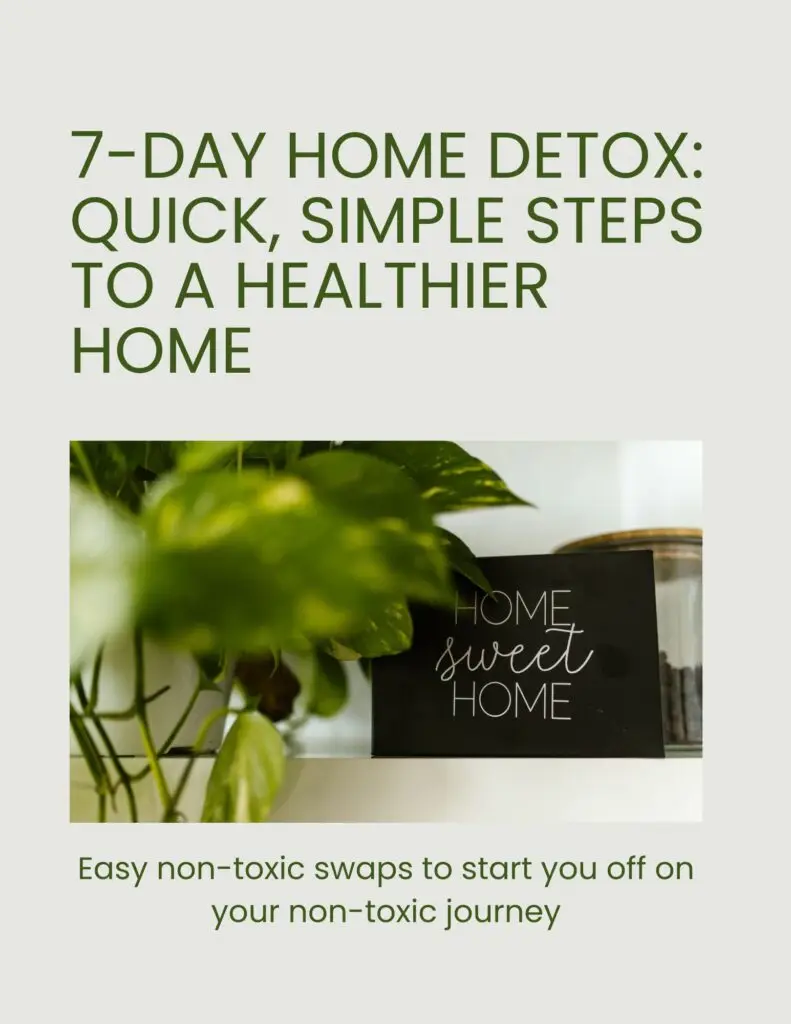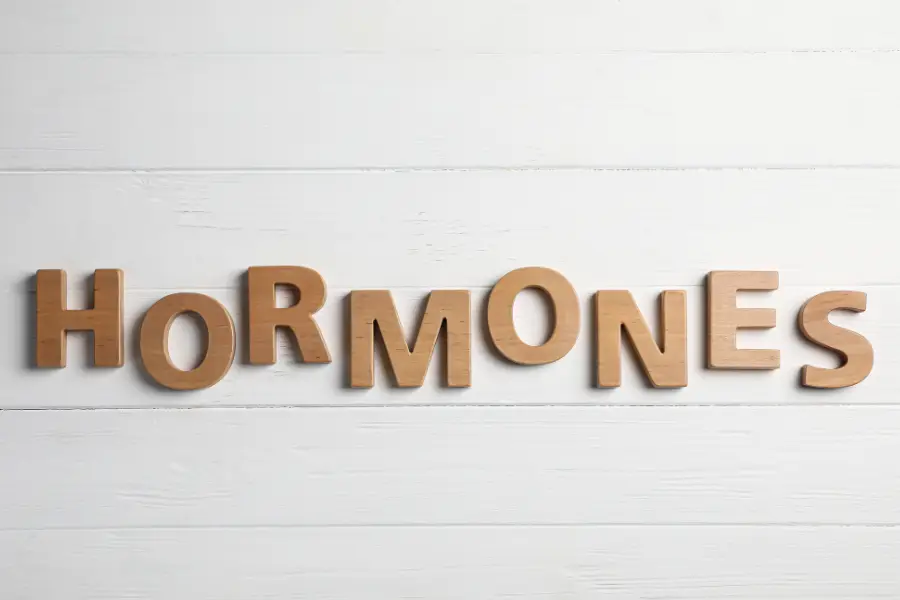Have you ever felt like your body is playing a never-ending game of hide-and-seek with your wellbeing? The culprit behind these mysterious health issues might be a hormone imbalance.
If you’re reading this, chances are you’ve experienced the rollercoaster ride of hormone-related problems without understanding why.
So, we’re diving deep into the world of hormone imbalance, shedding light on the pain, symptoms, and the sneaky hormone-disrupting chemicals hiding in your home that could be contributing to your struggles.
Get your Free 7-Day Home Detox Guide For Beginner’s
Hormone Imbalance: The Silent Agony
Hormones are the tiny but mighty chemical messengers that regulate various bodily functions. They play a crucial role in your overall well-being, impacting everything from your mood and energy levels to your menstrual cycle and fertility. When your hormones are in balance, you feel great. However, when that balance gets thrown off-kilter, it can lead to a wide range of symptoms that can make life pretty challenging.
The Pain of Hormone Imbalance
One of the most frustrating aspects of hormone imbalance is the pain it can bring into your life. This pain can be both physical and emotional, and it often goes undiagnosed or misattributed to other causes. Let’s talk about some of the pain associated with hormone imbalance:
- Menstrual Pain: For many women, monthly menstrual pain is par for the course. But for those with hormone imbalances, the pain can be excruciating. Dysmenorrhea, or severe menstrual cramps, can make that time of the month feel like a never-ending nightmare.
- Headaches and Migraines: Hormonal fluctuations, particularly a drop in estrogen, can trigger debilitating headaches and migraines. These headaches can disrupt your daily life and leave you in agony.
- Breast Tenderness: Hormonal changes can lead to sore and tender breasts, making it painful to wear a bra or even hug a loved one.
- Endometriosis Pain: Women with endometriosis experience severe pelvic pain, often mistaken for ordinary menstrual discomfort. This chronic pain can interfere with daily activities and relationships.
- Emotional Turmoil: Hormone imbalances can wreak havoc on your emotions. Anxiety, depression, mood swings, and irritability become your unwelcome companions. It’s like living on an emotional rollercoaster.
- Bone and Joint Pain: Changes in hormone levels can affect your bones and joints, leading to discomfort and pain, especially during menopause.
- Hair Loss and Acne: Hormonal imbalances can result in hair loss and unsightly acne, causing not only physical discomfort but also impacting self-esteem.
These symptoms can feel overwhelming and often occur simultaneously, making it difficult to pinpoint the root cause of your discomfort. You may have visited countless doctors and specialists, only to receive inconclusive or misdiagnosed results. But here’s the thing – there may be a hidden villain in your home that’s contributing to these hormonal woes.
Hormone Disrupting Chemicals in Your Home: The Unseen Culprits
Your home should be a sanctuary, a place of comfort and safety. However, it’s surprising how many hormone-disrupting chemicals can lurk within your very own walls, wreaking havoc on your hormonal balance.
These insidious chemicals are found in everyday products and can be challenging to avoid.
Let’s take a closer look at some of the common culprits and how they may be contributing to your hormone imbalance:
- Phthalates: These sneaky chemicals are found in fragrances, cosmetics, and plastic products like food containers and toys. They can mimic hormones like estrogen and disrupt your endocrine system.
- Parabens: Often used as preservatives in cosmetics and personal care products, parabens can act like estrogen in your body, leading to hormonal disruption.
- Bisphenol A (BPA): You’ve probably heard about BPA in plastics. It can leach into your food and drinks from containers and disrupt your hormonal balance.
- Pesticides: Residue from pesticides in your food can mimic estrogen in your body, affecting your hormonal health. Opt for organic produce whenever possible.
- Flame Retardants: These chemicals are commonly found in furniture, mattresses, and electronics. They can interfere with thyroid and estrogen hormones.
- Artificial Fragrances: Air fresheners, scented candles, and household cleaning products often contain synthetic fragrances that can mess with your hormonal system.
- Nonstick Cookware: Pans coated with perfluoroalkyl substances (PFAS) can release harmful chemicals when heated, potentially disrupting your hormones.
Taking Control of Your Hormonal Health
The good news is that you’re not powerless in the face of these hormone-disrupting chemicals. There are steps you can take to reduce your exposure and regain control of your hormonal health:
- Choose Natural and Organic Products: Opt for personal care and cleaning products with natural, organic, and chemical-free ingredients. Look for labels that specifically state they are free from parabens, phthalates, and other harmful substances.
- Minimize Plastic Use: Limit your use of plastic containers, especially when storing or heating food. Instead, choose glass or stainless steel options. Also, be aware of BPA-free products, as they may still contain other problematic chemicals.
- Eat Organic: Whenever possible, opt for organic fruits and vegetables to reduce your exposure to pesticides. It’s a small change that can make a big difference.
- Avoid Artificial Fragrances: Ditch the synthetic fragrances in air fresheners, candles, and cleaning products. Opt for natural scents (like this stovetop potpourri) or fragrance-free alternatives.
- Mind Your Cookware: Replace nonstick cookware with safer options like cast iron or stainless steel. Also, be cautious with old, scratched pans, as they can release harmful substances.
- Educate Yourself: Be a label detective. Read the ingredient lists of your personal care products, cleaning supplies, and even your food. Familiarize yourself with common hormone disruptors and avoid them when possible.
- Filter Your Water: Consider using a water filter to reduce exposure to contaminants that can interfere with your hormonal health. Water filters are not a “one size fits all” thing. Have your water tested so you know what contaminants are in YOUR water so you can make sure you have the appropriate filter.
- Consult a Healthcare Professional: If you suspect you have a hormone imbalance, don’t hesitate to seek medical advice. Hormone testing can provide valuable insights, and healthcare professionals can help you develop a tailored treatment plan.
In Conclusion: Reclaim Your Hormonal Balance
Living with a hormone imbalance can be a frustrating and confusing experience, but you’re not alone. There are countless women out there who share your struggles. By understanding the pain and recognizing the symptoms associated with hormone imbalance, you’ve already taken a crucial step towards regaining your health.
Remember, while hormone-disrupting chemicals in your home may contribute to your issues, you have the power to reduce your exposure and mitigate their effects. With informed choices and a proactive approach to your well-being, you can work towards reclaiming your hormonal balance and enjoying a happier, healthier life.
Don’t give up on finding the answers you deserve. Continue seeking support from healthcare professionals, and don’t be afraid to share your journey with others who may be going through similar challenges. Together, we can unravel the mysteries of hormone imbalance and find the solutions that work best for us. You’ve got this!
Want More Tips? Download the Free “7-Day Home Detox Guide”
Looking to make changes in other areas of your home? My free “7-Day Home Detox Guide” offers simple, low-cost steps to make your home healthier, one day at a time.
Get it here to start building a non-toxic lifestyle that works for you!

Where to Go from Here: Resources to Keep You Empowered
Your non-toxic journey doesn’t have to be a lonely one.
You can stay connected on social media Facebook | Instagram | Pinterest, where I share daily tips, product recommendations, and encouraging messages to keep you inspired on your journey.
And if you’re looking for trustworthy, non-toxic products to add to your routine, my online shop is curated with only the best low-toxic and non-toxic items I personally use and recommend.
Get started:
– Follow on Social Media: Facebook | Pinterest | Instagram
– Shop Curated Non-Toxic Products.


